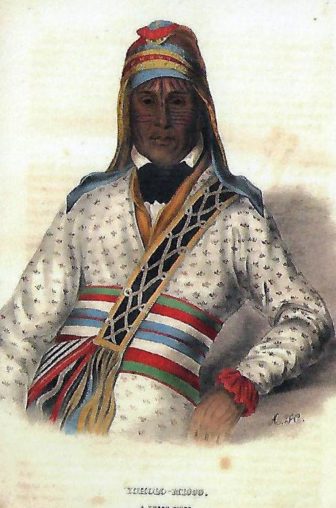Yoholo Micco
Chief Upper Creek Town of Eufaula

This image depicts Yoholo Micco, who served as chieftain of the Upper Creek town of Eufaula, located along the Tallapoosa River.
During the Creek War of 1813-1814, Yoholo-Micco served with McIntosh against the opposing group of Native Americans. This Eufala chief and orator was also a part of the Creek delegation to Washington in 1825-6 that objected to the Indian Springs treaty of 1821. Through this treaty, the Creeks had lost much of their land, but Yoholo-Micco was unable to get it back. Consequently, he participated in his village’s removal from Alabama and died in 1838 in Arkansas.
“Chief Eufaula,” the man often referred to in the historical record as “Yoholo Micco,” was a Creek chieftain from the Upper Creek town of Eufaula. Born in the late 1700s, he fought alongside allied Creeks with United States forces against his Red Stick Creek brethren in the Creek War of 1813-14. Following the war, Chief Eufaula rose to assume a variety of leadership positions including helping negotiate treaties between the creeks and the U.S. He died in Arkansas in 1838, shortly after being forcibly removed from his homeland.
Yoholo Micco is believed to have been the “Chief of Eufaula” who presented an emotional address to the Alabama legislature at the state capitol in Tuscaloosa in 1836. Reputedly, the speech was given while the chief was on his way west to Indian Territory after forced removal. While his exact words are lost to history, accounts of the words he delivered have become a part of our memory of the process of Creek Removal. This may be in no small part due to the fact that they sound as if he accepted removal with resignation. Although Chief Eufaula was known as an advocate of accommodation with Americans so as to avoid war, his true thoughts on the course his people were forced to take will likely never be known.